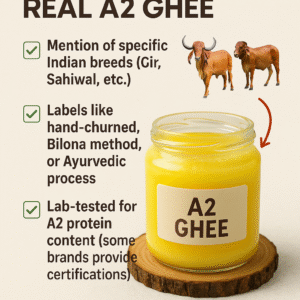A2 Cow Ghee vs. Regular Ghee — What’s the Real Difference?
In Indian kitchens, ghee holds a sacred spot — from festive feasts to Ayurvedic remedies. But today, there’s growing buzz around a specific type: A2 Cow Ghee. Is it truly superior to regular ghee? Or is it just another health trend?
Let’s decode the science behind it and find out what really sets A2 ghee apart — and why your body might thank you for making the switch.
And What’s “Regular” Ghee?
“Regular” ghee in the market is often made from milk of crossbred or foreign cows (like Holstein Friesian or Jersey). This milk contains a mix of A1 and A2 proteins, and in most cases, it’s machine-processed in bulk, often lacking the traditional touch and medicinal qualities of handmade A2 ghee.
What Is A2 Cow Ghee?
A2 Cow Ghee is made from the milk of desi Indian cow breeds like Gir, Sahiwal, Tharparkar, or Red Sindhi. These breeds naturally produce A2 beta-casein protein in their milk — which is considered healthier and easier to digest compared to the A1 protein found in most commercially available dairy products.
The Science Behind A1 vs A2 Protein
Here’s where it gets interesting.
A2 beta-casein breaks down easily in the human gut and produces a peptide called BCM-9 (beta-casomorphin-9) that is non-inflammatory.
A1 beta-casein, found in regular milk, also produces BCM-9 — but studies suggest this version may trigger gut inflammation, discomfort, and auto-immune responses in some people.
📚 Research published in the European Journal of Clinical Nutrition (2014) indicates that switching from A1 to A2 milk reduces symptoms of lactose intolerance, bloating, and inflammation.
🥄 A2 Cow Ghee vs. Regular Ghee: Key Differences
| Feature | A2 Cow Ghee | Regular Ghee (Mixed/Crossbred Milk) |
|---|---|---|
| Source | Indigenous Desi Cows | Crossbred/Foreign Cows |
| Protein Type | A2 Beta-casein (Safe) | A1 + A2 (May produce BCM-7) |
| Digestibility | Easier on stomach | May cause bloating/discomfort |
| Process | Bilona method (traditional) | Cream separation or industrial |
| Cost | Higher (due to yield & process) | Cheaper |
| Health Impact | Anti-inflammatory, gut-friendly | Can be pro-inflammatory in sensitive people |
Add Your Heading Text Here
Lorem ipsum dolor sit amet, consectetur adipiscing elit. Ut elit tellus, luctus nec ullamcorper mattis, pulvinar dapibus leo.

Conclusion
Absolutely — if you’re looking to:
Reduce inflammation
Support gut health
Improve immunity and hormonal balance
Switch to a traditional and cleaner lifestyle
While regular ghee isn’t inherently bad, A2 Cow Ghee is clearly a more nourishing, bioavailable, and therapeutic option — one that aligns with both ancient Ayurvedic practices and modern science.






You must be logged in to post a comment.